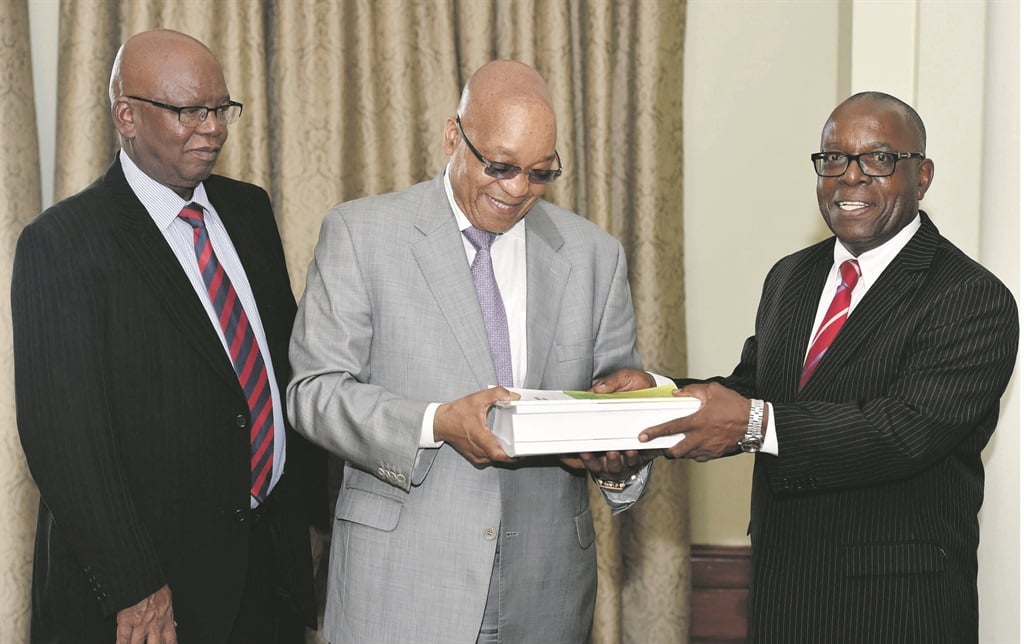
Zuma this week figured he has closed the book on a saga that robbed a virgin SA of its innocence, but taints remain
An early draft of President Jacob Zuma’s address to ANC supporters at the party’s election manifesto launch last Saturday contained a very bold pronouncement on corruption.
“Corruption has also been brought to the fore. This phenomenon is eating away at the credibility of the state,” Zuma was going to tell the party faithful at the Nelson Mandela Bay Stadium.
Alas, it was edited out of the final speech and the president never got to make what was going to be the strongest statement he was ever going to make on the subject.
He had to wait until Thursday to utter a word about corruption. But when he did, it was to exonerate the government from corruption related to the 1999 multibillion-rand arms deal.
Releasing the long-awaited report of Judge Willie Seriti’s Arms Procurement Commission, Zuma stated that “not a single iota” of evidence had been placed before the commission proving that any ministers or government officials had received money in connection with the arms deal. (In case you are wondering: yes, he did pronounce “iota” correctly.) In his mind, this closed the chapter on the long-running saga.
The following day, he sent letters of reprimand to several ministers who were named in the Public Protector’s report into the Nkandla project. In his mind, these slaps on the wrist were part of closing the chapter on the controversy that has dogged the R246 million upgrades to his home.
Then, to his mind, he could go off and cuddle numbers one, five and six in bed at night, and sleep easily with nothing to fever the presidential brow.
While he may be totally wrong when it comes to closing the chapter on Nkandla, he is probably correct that the arms deal saga has come to an end.
The deal has been an albatross around the neck of government since reports of corruption first emerged in 1999. The initial response of Thabo Mbeki’s government was to simply deny the accusations and hope they went away.
When the accusations grew into a full-scale scandal, Mbeki’s Cabinet appointed a multiagency investigation headed by then national director of public prosecutions Bulelani Ngcuka, then Public Protector Selby Baqwa and then Auditor-General Shauket Fakie to probe the deal.
The report by the agencies found that the primary deal – the one that involved the purchase – had been totally above board, but that the secondary phase – the one involving the fittings inside the weaponry – might have been compromised.
The Scorpions were tasked with following up on leads related to corruption in the secondary phase.
But even this investigation, headed by three men who were perceived to be of high integrity, was called into question. There were claims of political interference, political bias and even accusations that Ngcuka, Baqwa and Fakie had allowed their final report to be edited to cover up for heavyweights.
The men managed to recover their reputations, but the stench of cover-up would dog them for years.
Next to be mired in the mess was Parliament, whose Standing Committee on Public Accounts (Scopa), as Parliament’s financial watchdog, was duty-bound to check this large expenditure item.
Scopa was bullied by ANC leaders into softening its own oversight work. Former ANC parliamentarian Andrew Feinstein recounts in his book After the Party how Mbeki’s Rottweiler, Essop Pahad, roughed up him and his Scopa ANC colleagues, saying: “Who the f**k do you think you are, questioning the integrity of the government, the ministers and the president?”
Inside the ANC, the arms deal wrought havoc as it played into the pre-Polokwane conflicts.
With senior MP Tony Yengeni and Zuma’s financial adviser Schabir Shaik having being jailed in connection with arms deal-related offences, and Zuma himself in the spotlight, there were accusations that the Scorpions were pursuing selective investigations to consolidate Mbeki’s power and prolong his stint as the leader of the ANC.
As the scandal grew instead of going away politely, government stuck to its mantra that the primary contracts were above board. Mbeki ignored calls for a judicial commission of inquiry, arguing that the three-agency investigation had been conclusive.
It took court action by activist Terry Crawford-Browne to force Mbeki’s successor to appoint the judicial commission of inquiry. But even this process had its fair share of victims, including senior members of the commission, who walked away muttering darkly that the outcome was fixed.
The biggest casualty, however, was the judiciary in the form of commission chair Seriti. A respected judge of the Supreme Court of Appeal, Seriti has always had bigger things coming his way. But now he will wear the taint of being the man who covered up the arms deal, a blemish that will haunt him should he seek higher office.
In closing this chapter on Thursday, Zuma stated that if there had been findings of wrongdoing, they would have been handed over to law enforcement agencies, but since “there are no such findings”, that was the end of that. With little energy and appetite left in a society that has moved on to other more tangible scandals, only the obsessed are likely to pursue this further.
And so the saga that introduced us to the grubby world of megadeals, taught us the ins and outs of corruption, compromised the innocence of our new republic and gnawed away at our body politic ends inconclusively and unsatisfactorily.
It’s just as well that Zuma didn’t make those remarks last Saturday.




 Publications
Publications
 Partners
Partners








